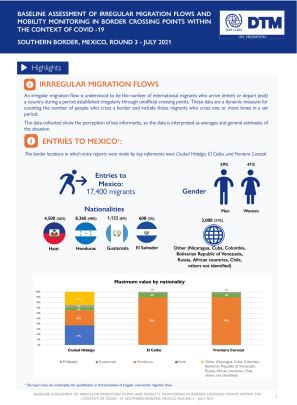-
Countries
-
Data and Analysis
-
Special Focus
-
Crisis Responses
Mexico-Baseline assessment of irregular migration flows and mobility monitoring in border crossing points within the context of COVID-19 #3 (July, 2021)

Contacto
Laura Canché, lcanche@iom.int
Idioma
English
Ubicación
Mexico
Fecha de instantánea
Jul 01 2021
Jul 31 2021
Actividad
- Flow Monitoring Survey
- Flow Monitoring
- Mobility Tracking
- Baseline Assessment
At the beginning of July, a public hearing was held with various civil society organizations that advocate and defend the human rights of persons in the context of human mobility, the Mexican State and the Inter-American Commission on Human Rights (IACHR).
The main concerns of civil society were that the Mexican government has prioritized military presence at the borders through the deployment of National Guard elements and the assignment of military profiles in INM entities.
They also denounced the securitization approach taken by the Mexican government to address the migration phenomenon. Another situation they made visible was the violation of the principle of non-refoulement, as Mexico has promoted "pushbacks" or hot returns. These practices do not guarantee the right to apply for refugee status in Mexico.
On the other hand, the Mexican Government argued that it has worked on a strengthening plan for the attention of refugees entering through the southern border with the support of the UNHCR and has also provide training for officials regarding human rights of migrants. The government also acknowledged that the administrative capacities of the institutions have been overwhelmed but argued that they are working in collaboration with various international organizations such as the International Organization for Migration (IOM) and the UNHCR.
Finally, COVID-19 cases have increased in Mexico. Several governmental institutions such as the State Attorney's Office for the Protection of the Family and the Rights of Children and Adolescents (PROFADE) and the Mexican Commission for Refugee Aid (COMAR) were affected by the health crisis in July.
